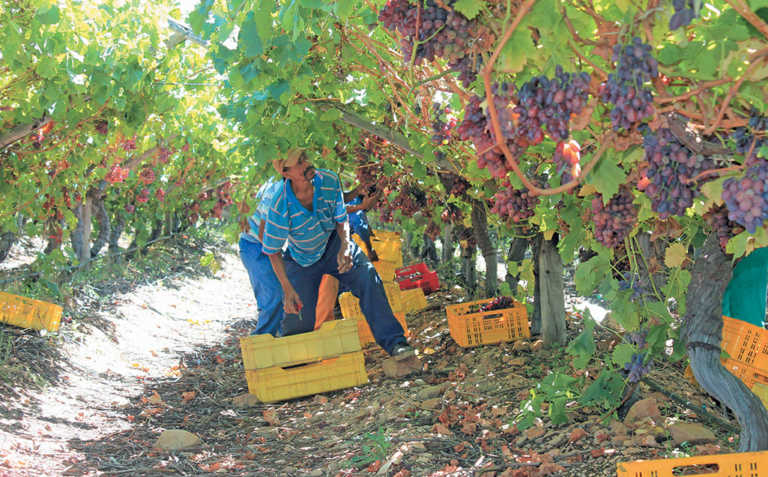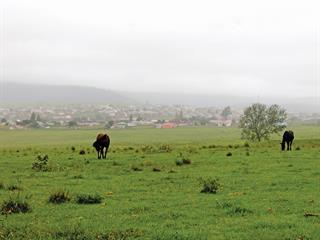
Photo: Jeandré du Preez
To be successful, don’t treat a land reform farm as a project. It’s a business, and as the owner, you shouldn’t look for handouts. So be on the lookout for profit-making opportunities and ways of providing high levels of employment.
This is according to Alec Abrahams, managing director of Siyazama Klipland Boerdery, a BEE company in De Doorns in the Hex River Valley, Western Cape.
For Alec, acquiring Siyazama Klipland was the realisation of a long-held ambition after years of encouraging youngsters to become entrepreneurs.
“I obtained a B. Com, then taught accounting at a high school. But owning my own business was always my dream,” he recalls.
This opportunity presented itself 12 years ago when the late Niel Jordaan’s farm, Klipland, come onto the market at a fair lease. Alec and his wife, Charlene, joined up with six others – Vaaltyn and Katriena Pieterse, Johannes and Maria Matabo, Liesbet Jack and Jersey Mxala – and approached Frans Hugo, a local farmer for guidance in obtaining the farm.
Frans became their mentor and helped them make a success of the venture.
For two years, the group leased the 40ha farm on their own. Then the Department of Rural Development and Land Reform (DRDLR) bought the farm for about R5 million as an empowerment initiative, and Siyazama has been leasing it from them as a Proactive Land ReformAcquisition Strategy (PLAS) farm ever since.
According to Alec, the beneficiaries of PLAS do not own the land: they are given long-term leases by government with the option of buying the land from the state after a certain period.
From seeded to seedless
In 2006, about 80% of the farm was planted to seeded grapes.
“Initially, it went well with the seeded grape varieties. When we took over the farm in 2007, we packed about 80 000 cartons, which we increased to 90 000 in 2008, turning our first profit. In 2010, we reached a record of 101 000 cartons,” Alec recalls.
In 2011, with the trend towards seedless grapes, they realised they had to make the change. Over the past seven years, Siyazama’s production has therefore been shifting steadily from seeded to seedless. Currently, around 60% of grapevines on the farm produce red seedless grapes, while black seedless grapes constitute 20% of production.
Crimson Seedless is the predominant variety planted, and Sweet Celebration, Flame Seedless, Autumn Royal and seeded Red Globe are also planted.
According to Alec, replanting was not without its difficulties.
“Our production fell from a record 101 000 cartons in 2010 to 80 000 cartons in 2011. Each year we replant between 2ha and 3ha. Replanting costs can run to R400 000/ ha, so most of our profits are reinvested in replanting,” he says.
Assistance
Alec credits the South African Table Grape Industry for funding some of the plant materials under their Preferred Cultivar, Preferred Country programme, as well as the DRDLR for assisting with input costs, and the Department of Agriculture, Forestry and Fisheries (DAFF) for providing implements and production capital.
He hopes that the replanting will be complete within the next two years, turning the farm into a 100% seedless operation. He adds, however, that they will reap the benefits only when the new varieties start producing significantly. The farm has the potential to pack 150 000 cartons a year.
“We hope to achieve that within the next two to three years,” he says.
Siyazama has its own packhouse, and exports are handled by In2Fruit. The EU and Far East account for 95% of export sales, 2% of the grapes are sold locally, and 3% are sent to De Doorns Wine Cellar.
Alec says in order for them to be independent of funding from the DRDLR, they secured a production loan from In2Fruit. The company supports a black-empowered fruit export company, Rainbow Produce, which assists with Siyazama’s exports.
Drought
As someone who grew up in the vineyards, Alec is no stranger to the challenges of farming. The 2017/2018 production season has been particularly difficult due to the drought, and he expects they will harvest about 80 000 4,5kg boxes.
“Although this figure is in line with that of previous years, it was a difficult season. In addition to the high temperatures, we were also without water for five days at the beginning of harvesting. It had a serious effect on our grapes. We’ve also been allocated just 45% of our annual water allocation.”
This prompted them to install a borehole.
Although Alec is grateful for the help received from the state, he says that when farming on state-owned land, acquiring credit finance is a struggle.
However, he hopes this will change as their lease agreement was extended by 30 years in December last year.
Other challenges include theft, high input costs and the limited size of their holding dam.
Creating jobs
A few years ago, unemployment and low wages triggered a strike at De Doorns.
“As business owners we have the responsibility to create jobs and put food on the table of our workers,” says Alec.
Currently, Siyazama employs 25 permanent workers and an additional 20 during the pre- and post-harvest periods for suckering and pruning. During harvesting, from the start of January until the end of March, they employ between 80 and 85 seasonal workers.
As a former teacher, Alec knows how important training and education are.
“Our workers regularly attend various courses. This doesn’t only have a positive effect on the business; it boosts the attitude, productivity and self-esteem of the employees,” he says.
He emphasises that the experience of the workforce has played a significant role in the success of the business.
“Siyazama is Xhosa for ‘We are trying’. Over the past 12 years, we’ve worked together and tried our utmost to contribute 2018to the farm’s success and create jobs for the local community.
“It’s safe to say we are now beyond simply ‘trying’; we’ve shown that we can succeed. We should think of changing our name,” he says.
Great expectations: plans for the farm
The next major step, says Alec, is to buy the property. “Hopefully within the next five years we’ll be able to do so. “We’re still in the process of developing the farm, but for this we’re partially dependent on government assistance,” says Alec.
He adds that due to the many failed land reform projects, there are many eyes on Siyazama. “We’re determined to make a success of this farm and to show we mean business.”
Phone Alec Abrahams on 072 606 3815, or email [email protected].










